Peranakan is Malay for “born here”, which refers to the Straits-born people of Chinese and Malay/Indonesian heritage. The Straits Chinese lead vibrant lives that comprise of many Chinese and Austronesian facets. Male Peranakans are addressed as “Baba”, while females and the culture in general of this matriarchal community are referred to as “Nonya”.
Peranakan architecture is known for its ornate fixtures and adornments, and can be experienced at establishments like Candlenut, PeraMakan and National Kitchen by Violet Oon. These establishments boast Peranakan dishes adapted from Chinese, Indian, Malay and Eurasian tables.
“In the old days, young Peranakan girls had plenty of opportunities to learn the Peranakan crafts like beading and cooking from their mothers,” explains Kathryn Ho, who owns the popular restaurant chain PeraMakan. “In Peranakan households, there are always guests to feed, so matriarchs have lots of opportunities to cook, bake and create elaborate dishes that are not only delicious but colourful, artistic and creative.”
Indulgent treats
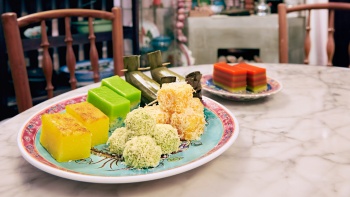
Kueh are sweet bite-sized snacks adapted from Malay recipes. When you partake in these indulgent treats, you are sharing in the joy that the giver of the kueh wishes to convey to you.
The most popular confections among the Peranakans’ plethora of kueh include rainbow-coloured and layered kueh lapis, as well as rolls of coconut and gula melaka (palm sugar) called kueh dadar. Various kueh can be enjoyed at Guan Hoe Soon, which opened in 1953 and seats guests at ornate marble tables and around engraved antique furniture—a common feature in some Straits Chinese homes.
Guan Hoe Soon Restaurant. 38/40 Joo Chiat Place, Singapore 427764. +65 6344 2761.
Mon-Fri 11am-3pm, 6-9pm; Sat & Sun 11am-3pm, 5.30-9.30pm.
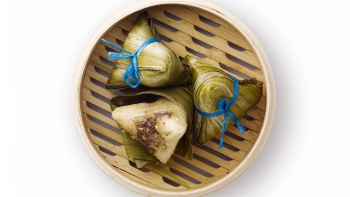
During the Chinese New Year, Kim Choo Kueh Chang, located a few doors down from Guan Hoe Soon, rolls out a special menu of confections in bottles, such as the leaven and sugared kueh bangkit (tapioca cookies). Visit Chinese households during the Lunar New Year and these snacks will be presented to welcome you. Kim Choo Kueh Chang opened right after World War II and grew into an empire built on kueh chang (nonya dumplings), which uses sweeter condiments than the Chinese bak chang (sticky rice meat dumpling). Kim Choo Kueh Chang also offers tok panjang (a feast, literally translates to ‘long table’), which comprises of an abundance of dishes that can feed a large family.
Kim Choo Kueh Chang. 60 Joo Chiat Place, Singapore 427784. +65 6741 2125.
Daily 9am-9pm.
Nuanced dining
The braised pork and fermented soy bean stew babi pongteh (nonya-styled braised pork) is a favourite of the Straits Chinese, while assam udang (spicy and sour shrimp) employs tamarind, which is indigenous to the Indian subcontinent. You’ll be able to savour these dishes at True Blue Cuisine, recommended by Michelin Singapore’s Bib Gourmand Guide.
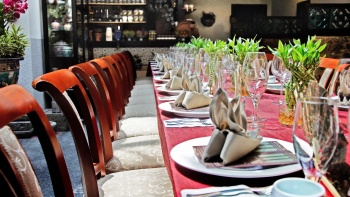
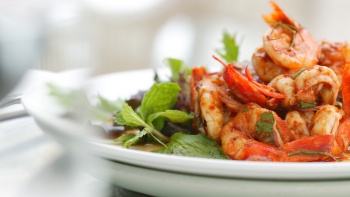
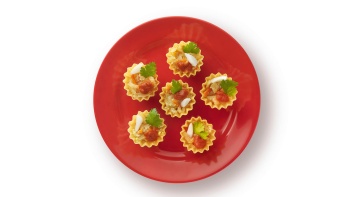
To sample other facets of nonya culture alongside its iconic dishes, pay a visit to The Intan. Alvin Yapp sought to gain better understanding of his Peranakan roots and ended up assembling this mini museum.
The Intan also organises ‘interactive tea experiences’, during which guests are taught how to prepare the crispy canapé kueh pie tee and bead their own bespoke slippers. “Peranakan culture assimilates the many cultures of our region,” Alvin shared. “The Peranakans’ religion, lifestyle, food, practices and behaviour encapsulate their surrounding ethnicities like nowhere else in the world.”
True Blue Cuisine. 47/49 Armenian Street, Singapore 179937. +65 6440 0449.
Daily 11.30am-2.30pm, 5.30-9.30pm
The Intan. 69 Joo Chiat Terrace, Singapore 427231. +65 6440 1148.
Daily 7am-10pm. By appointment only.
Peranakan strongholds
One-Michelin-starred chef Malcolm Lee of Candlenut personally selects his ingredients from wet markets, before using them to prepare his French gourmet-inspired renditions of nonya fare. Like any other authentic Peranakan chef, he meticulously treats his buah keluak (a black nut indigenous to Southeast Asia) for days, before these underground nuts are safe to eat.
This young chef, however, has different ideas for signature Peranakan flavours, and his culinary inventions —like Buah Keluak Ice Cream—have been well received.
Candlenut’s rattan shelves are filled with condiments and treats, and stand on colourful Majolica tiles. The latter has Western European origins, but have become a common fixture in Peranakan households, and a testament to nonya culture’s many historical influences.
National Kitchen by Violet Oon too seats customers in vintage style settings. Ceiling fans made of rattan swirl above its idyllic dining space, where Violet not only purveys the dry Peranakan version of laksa, but also showcases prawn bostador (prawns in a fragrant, tangy and spicy paste), which the Peranakans learned from interacting with Eurasians.
Savour her trademark chap chye, a mixed vegetable dish whose recipe Violet has demonstrated in numerous cook books and television programmes over the decades.
Candlenut. 17A Dempsey Road, Singapore 249676. +65 1800 304 2288.
Mon-Thu & Sun noon-3pm, 6-10pm; Fri & Sat noon-3pm, 6-11pm.
National Kitchen by Violet Oon. 1 St. Andrew’s Road #02–01, National Gallery, Singapore 178957. +65 9834 9935.
Daily noon-3pm, 6-11pm.
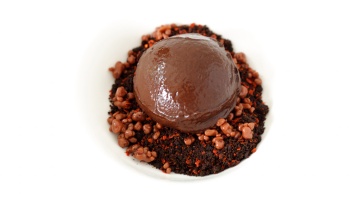
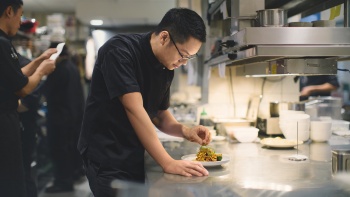
The culture lives on
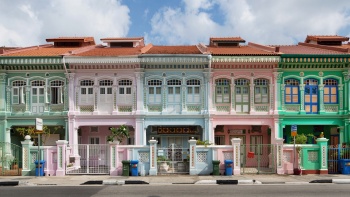 Photo by Darren Soh
Photo by Darren Soh “You have to see Joo Chiat and Katong to understand our way of life better, as it is the gateway of Peranakan culture,” recommends Raymond Wong, an internationally acclaimed kebaya (traditional nonya dress) designer who is also the son of Kim Choo Kueh Chang’s founder.
Formerly a coconut plantation where the Peranakans would socialise, the famous enclave of Joo Chiat and Katong had a two-storey police station, which now houses the modernist Peranakan restaurant Baba Chews. Baba Chews infuses classic dishes like beef rendang (braised beef cooked in coconut milk and spices) and kueh durian (kueh dadar stuffed with durian [a spiky tropical fruit that is unique to Southeast Asia], instead of the usual shredded coconut and palm sugar) with eclectic flavours and textures.
To complete your journey toward becoming an expert in all things Peranakan, walk off your hearty meal while admiring the colourful neighbouring shophouses and their French reliefs, which have housed this unique ethnic group for generations. “The architecture of Joo Chiat and Katong are part of our arts and culture,” opines Peter Wee, former President of the Peranakan Association. “We try to preserve these old houses as evidence for future generations to better understand the past.”
Baba Chews Bar and Eatery. 86 East Coast Road #01-01, Katong Square, Singapore 428788. +65 6723 2025.
Mon-Thu & Sun 6.30am-11pm; Fri-Sat 6.30am-midnight.